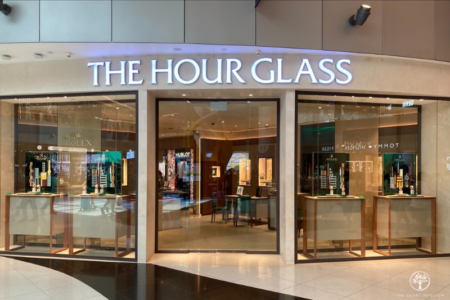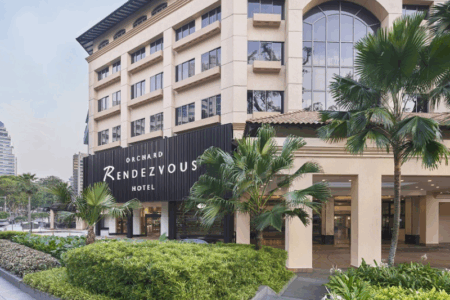August reminded us how volatile the stock market truly is.
While fear of a US recession temporarily overtook global markets, most had nearly recovered as of late August.
Both the S&P 500 (^SPX) and the Nasdaq Composite Index (^IXIC) have rallied since the sell-off in early August, while the Dow Jones Industrial Index (^DOW) has recently made a new historical high.
With optimism returning back to the market, investors will be looking forward to a better September.
Here are some of the biggest events and corporate news for August.
US interest rates
The latest meeting held by the US Federal Reserve (“Fed”) saw interest rates held steady at their highest in 23 years, in a range of 5.25% to 5.5%.
However, the US central bank hinted that it is now closer to easing its monetary policy as there was “further progress” in its fight against inflation.
The members of the Fed are gathering more data to gain the confidence to reduce interest rates, even as inflation continues to cool and the job market slows down.
Fed chairman Jerome Powell commented that a rate cut could be on the table in September if the stars align for inflation and the economy.
However, he reiterated that if inflation proved stickier than expected, then rates could still be maintained at current levels.
Three straight months of better inflation data have bolstered the case for an eventual rate cut before the end of this year.
However, investors may wish to hold their breath for now as incoming data for August and September will still be scrutinised closely to assess if a rate cut is appropriate.
Berkshire Hathaway (NYSE: BRK.B)
In a surprise move, Berkshire Hathaway, the investment company owned by famous investor Warren Buffett, announced that it had slashed its stake in Apple (NASDAQ: AAPL) by nearly 50%.
Berkshire sold US$75.5 billion worth of stock in the world’s largest company during 2Q 2024, sending its cash pile swelling to a record US$276.9 billion.
In addition to Apple, Berkshire has also significantly reduced its stake in Bank of America (NYSE: BAC), trimming this position by 8.8% since the middle of July.
Berkshire first disclosed its stake in Apple back in 2016 and has chalked up a massive unrealised gain on this position.
At the end of 2021, Berkshire had roughly 908 million shares of the technology company.
After the sale, the company is left with roughly 400 million shares of Apple which are valued at US$83.9 billion.
At May’s shareholder meeting for Berkshire Hathaway, Buffett had alluded to Apple remaining as the company’s top investment holding but implied that tax issues had motivated the divestment.
The sale will help the conglomerate avoid paying higher capital gains taxes.
Apple recently released its earnings for the third quarter of fiscal 2024 (3Q FY2024) ending 29 June 2024.
Revenue rose 4.9% year on year to US$85.8 billion while operating profit jumped 10.2% year on year to US$25.3 billion.
Net profit improved by 7.9% year on year to US$21.4 billion.
Apple’s Services revenue, which touched a new record, increased by 14.1% year on year to US$24.2 billion.
The business also generated a positive free cash flow of US$84.9 billion for the first nine months of the fiscal year.
Genting Singapore (SGX: G13)
Genting Singapore also released its 1H 2024 earnings and delivered a strong set of results.
Revenue climbed 25% year on year to S$1.36 billion led by a 28% year-on-year increase in gaming revenue to S$957.6 million.
Non-gaming revenue rose 19% year on year to S$397.9 million, with attractions bringing in the biggest year-on-year jump at 25.3% to hit S$201.3 million.
The hotels segment also saw a healthy 19.7% year-on-year increase in revenue to S$121.5 million.
Operating profit for the blue-chip group rose 29% year on year to S$450.9 million with net profit also increasing by 29% year on year to S$356.9 million.
The business also generated a positive free cash flow of S$261.2 million, up 18.3% from 1H 2023’s S$220.8 million.
In line with the healthy growth in net profit, Genting Singapore upped its interim dividend by 33% from S$0.015 last year to S$0.02.
The first phase of the integrated resort’s makeover, titled RWS 2.0, remains on track for a soft opening in early 2025.
These include Illumination’s Minion Land and the Singapore Oceanarium, along with the ongoing development of the Central Lifestyle Connector and an all-suite hotel to replace the Hard Rock Hotel.
Two new luxury hotels will also begin construction in the fourth quarter of this year.
Sea Limited (NYSE: SE)
Sea Limited also released its 2Q 2024 earnings recently.
Total revenue rose 23% year on year to US$3.8 billion for the quarter, led by a strong performance from its e-commerce division (Shopee).
Shopee’s revenue jumped 30.4% year on year to US$3 billion but this was offset by a 17.7% year-on-year revenue decline to US$ 435.6 million for Sea’s digital entertainment (Garena) division.
Operating profit plunged nearly 71% year on year to US$82.9 million and was impacted by a sharp 57% year-on-year surge in sales and marketing expenses to US$774.8 million.
Sea reported a net profit of US$79.9 million for 2Q 2024, down three-quarters year on year from last year’s US$331 million.
Digging further into each division, Shopee saw its GMV increase by 29.4% year on year to US$23.3 billion.
Gross orders on the division’s e-commerce platform shot up nearly 39% year on year to 2.5 billion.
Management believes that Shopee should become adjusted EBITDA positive in 3Q 2024 and is revising the full-year GMV growth rate to the mid-20% region.
Over at Garena, its popular Free Fire game continued to be the most downloaded game globally during the quarter.
The multiplayer online game saw more than 100 million daily active users (DAU) every day throughout 2Q 2024, a testament to the game’s consistent popularity.
Quarterly active users (QAU) for 2Q 2024 came in at 648 million, up 19% year on year.
The more important metric, quarterly paying users, increased by 22% year on year to 52.5 million.
Despite the improvement, Garena still saw a 29% year-on-year fall in operating profit to US$210 million for the quarter.
For its Digital Financial Services division, total loans hit US$3.5 billion and were up 40% year on year.
The division made good progress in registering over four million first-time borrowers for its credit products, which was more than double the number onboarded in the prior year’s quarter.
Investors will also be pleased to note that the business generated an operating cash flow of US$1.1 billion and spent just US$91 million on capital expenditures.
If you’re looking to buy the next S$100 billion stock in SGX, pay attention to our newest FREE report. We dug deep and uncovered which SGX companies have the potential for massive growth. Even if the numbers look great, things aren’t always what they seem. We let the numbers tell us the full story. Download for free now!
Follow us on Facebook and Telegram for the latest investing news and analyses!
Disclosure: Aw Kai Rui does not own shares in any of the companies mentioned.





